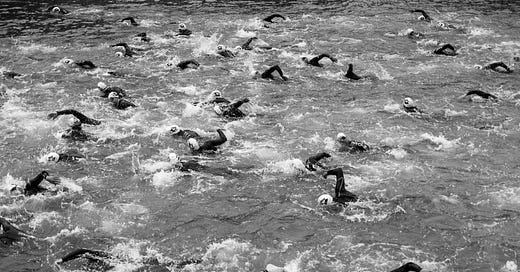You're Being Lied to About Hard Work
Beyond the Grind: How Innovation and Boundaries Drive Real Achievement
Hard work leading to success is a myth
-Marc Rudolph, Co-Founder and First CEO of Netflix
It’s time to kill the myth that hard work alone guarantees success.
Yes, hard work is necessary at times. You’ll need grit and determination, and you will need to sacrifice some weekends, cancel plans, and pull all-nighters. But the truth is, hard work is not the deciding factor in long-term success.
Many people work incredibly hard their entire lives without achieving the success they envision. Why? Because success is more complex than effort alone.
Let me explain.
Early Career Exhaustion: The Sprint to Open Water
In the early stages of your career, hard work feels non-negotiable. You need to learn fast, adapt, and prove your value in the world of work. Marc Randolph, co-founder and first CEO of Netflix, perfectly explains this phase.
Randolph compares early career success to the start of a triathlon. A triathlon is a three-part race that can start with swimmers diving into the water at once, thrashing and kicking to escape the chaos. In this scenario, when the swimming start is not staggered, the only way to get ahead is to sprint for open water—to swim faster, harder, and more aggressively than everyone else.
Randolph relates this need to sprint in a triathlon to the early stages of a career. You need to work harder, longer, and smarter to break free from the pack, differentiate yourself, and gain critical experience. This is the unavoidable grind of establishing your career.
But here’s the critical insight: you can’t sprint forever. I think we know that we can’t sprint forever in almost every other aspect of our lives except for work. When we start our careers sprinting, it may initially seem doable, that is, until you have a partner in the picture, an aging parent or a few kids.
Let’s look at how this usually manifests for most people.
Mid-Career Burnout: The Choice You Must Make
Fast forward a few years, and you are no longer a newbie or an early grad. You’ve been promoted, changed jobs a few times and maybe changed companies. You’ve gained recognition, received a few enticing bonuses, and now hold a senior management title. Outside of work, you've probably bought a new car, purchased a home or saved for one, and you’re also juggling the demands of family life, maybe raising young kids. Slowly, almost insidiously, your once manageable workload feels suffocating, and you’ve fatigued mentally, physically and emotionally- your ability to sprint to get things done has diminished significantly.
This is what I call the Mid-Career Choice, and a bit oversimplified, but you, in essence, have one of two choices:
Slow down and prioritize sustainable growth across the domains of your life (work, home, relationships, physical health, mental health)
or
Or push forward to maintain a sprint - and risk burnout and long-term damage.
This is where Marc Randolph extends his triathlon analogy very simply: after the sprint, you must settle into a sustainable pace. Sprinting the entire race is impossible without a significant negative impact, and career success works similarly.
So, what does a step back look like?
This may mean temporarily stepping off the succession ladder, turning down a promotion, or staying in your current role longer than planned to give you breathing room in other domains of your life. All of these are not only okay but strategically important because pacing yourself protects you from burnout and keeps you in the race for the long term.
This is the thing - slowing down, stepping back, and letting go takes a lot of courage and is very difficult when we over-identify our sense of self-worth and personal value with our work.
Why Hard Work Isn’t Enough
If you have read any of my earlier posts, you will have already heard me say it, but I feel like it can't be said enough- the most successful people aren’t the ones who work the hardest. They’re the ones who think differently. Randolph also subscribes to this belief and explains that relentless hard work perfecting presentations and over-preparing for meetings doesn’t guarantee success.
What makes the difference is experimentation, innovation, and the ability to think strategically.
In fact, studies show that:
Working 55+ hours a week does not significantly improve productivity compared to working 40 hours.
Burnout reduces creativity, decision-making ability, and emotional intelligence, which are critical traits for leadership.
Strategic rest and cognitive recovery improve long-term performance more than continuous effort.
Breaking Free from Hustle Culture
Marc Randolph is not your typical Silicon Valley CEO because he doesn't just publicly advocate for boundaries and balance. He role models it. One of his most viral LinkedIn posts, viewed by over 20 million people, shared how he prioritized a weekly date night with his wife, even while running Netflix.
Why did it resonate so deeply? Because hustle culture is breaking people, millions are desperate for a model of success that doesn’t glorify burnout.
Randolph’s leadership on empathy, boundaries, and strategic thinking is an example of that alternative model, one where you don’t have to sacrifice your sense of empathy, health, relationships, or sanity to succeed.
Imagine if more CEOs, founders, and leaders embraced this mindset. Our workplaces would be more humane, our leaders more compassionate, and our lives more sustainable.
Work Smarter, Not Harder
Hard work can open doors, but it won’t keep them open. Success comes from strategic thinking, innovation, and knowing when to slow down and recover. If you stay in the burnout loop, you risk losing everything: your health, relationships, and career that you have prioritized over everything else.
It’s time we redefine success—not as a race to exhaustion but as a journey built on focus, balance, and strategic patience.
I’ll see you in the open water.
You can watch Marc Rudolph’s entire 2-hour interview below, it’s worth a watch/listen. His answer to Does hard work matter? is at minute 54:54
If you want to learn more from Marc, he also has a newsletter on Substack: Marc's Substack
Until next time, take care of yourself and those around you.
In Partnership,
Nabeela
When did you finally get into open water in your career?
If you would like to learn more about the world's unhealthy relationship with work, success, and achievement and discover ways to get out of the burnout loop, check out some of my other posts below.








